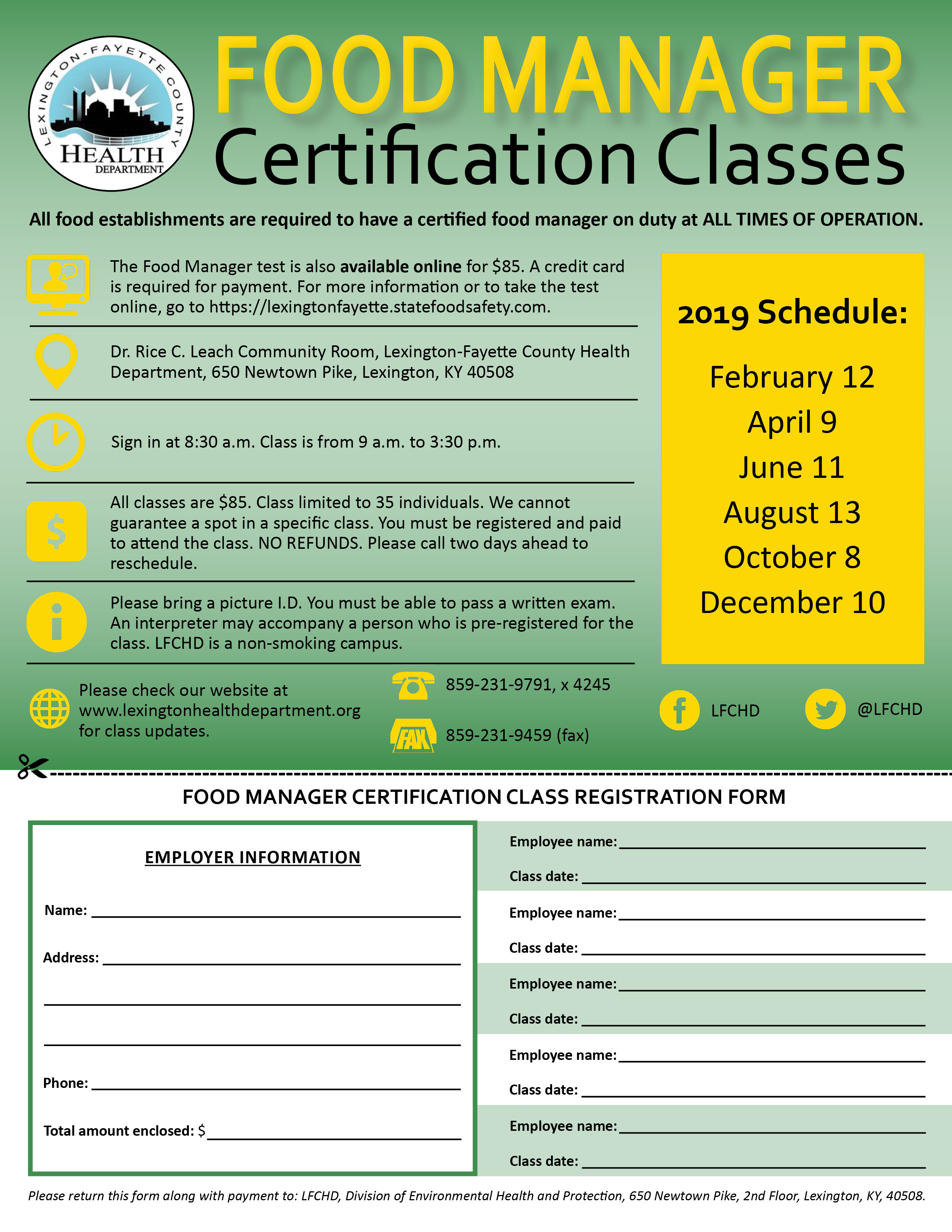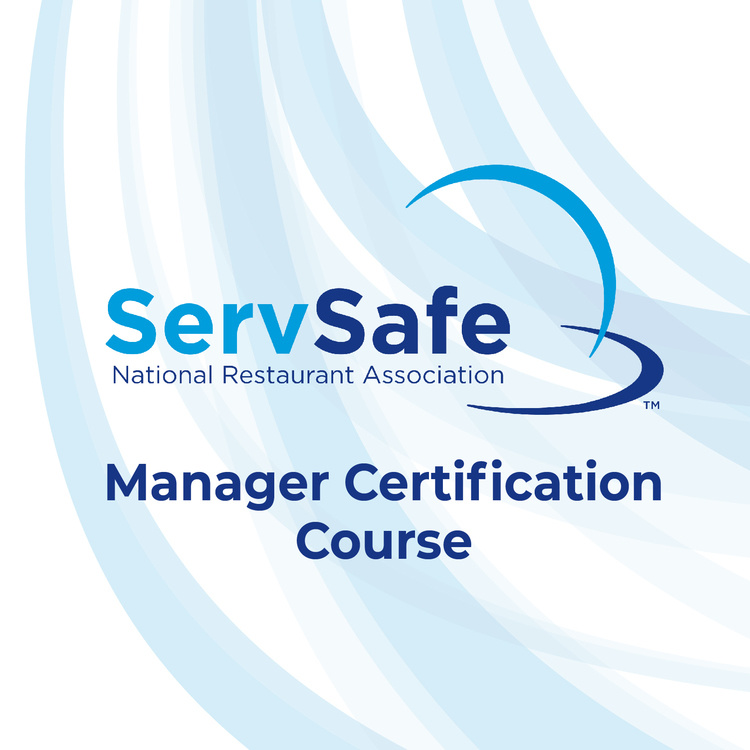Expert Training for Food Manager Qualification Made Simple
The relevance of food manager accreditation can not be understated, especially in a period where food security is paramount. Professional training programs have actually developed to simplify the certification procedure, giving vital expertise and useful abilities necessary for effective food administration. These programs cover critical topics, from foodborne health problem avoidance to compliance with health and wellness laws. The real value of this training extends beyond simple qualification; it has extensive effects for career development and public health and wellness. Understanding how these aspects interconnect may reveal opportunities that are usually neglected.
Significance of Food Manager Certification
The value of Food Supervisor Certification can not be overemphasized in today's food solution sector. This certification indicates that food managers have the necessary knowledge and abilities to make sure food safety and security, keep health and wellness standards, and maintain governing conformity. In an era where foodborne health problems can have severe effects, the duty of a licensed food supervisor ends up being crucial in guarding public wellness.
Food Supervisor Certification not just furnishes people with the know-how to reduce and determine food safety and security dangers but additionally boosts the trustworthiness of the establishment. Customers are increasingly discerning; they look for assurance that their dining experience is sanitary and safe. Qualification acts as a mark of expertise that can bring in and maintain clients.
Additionally, local jurisdictions and numerous states mandate that facilities utilize qualified food managers to follow health and wellness laws. This requirement emphasizes the certification's relevance in avoiding prospective lawful implications and penalties. In addition, a licensed food manager can lead team training, promoting a society of safety and liability within the office. Buying Food Supervisor Accreditation is a financial investment in top quality, safety and security, and the general success of food solution operations.
Introduction of Specialist Training Programs
Professional training programs for food manager certification are made to supply extensive education on food safety practices, governing conformity, and threat administration. These programs aim to equip food solution professionals with the understanding and abilities required to make certain safe food handling and prep work in numerous settings, including restaurants, providing solutions, and institutional food procedures.
Generally, professional training programs incorporate both theoretical and sensible parts, enabling individuals to involve with real-world circumstances. The curriculum commonly consists of crucial subjects such as foodborne health problems, proper food storage space strategies, cleanliness protocols, and staff member training techniques. These programs are regularly upgraded to straighten with the newest sector requirements and guidelines, making sure that participants get relevant and current details.
Numerous programs provide adaptable delivery methods, consisting of in-person courses, on-line programs, or a hybrid method, satisfying different discovering choices and timetables. Upon successful conclusion, individuals generally get accreditation, which is frequently identified by local health and wellness departments and governing firms, enhancing their occupation leads within the food service sector. Generally, expert training programs play a critical role in fostering a society of food security and compliance amongst food supervisors and staff.
Secret Topics Covered in Training
Food security is a critical emphasis in food manager accreditation training, including a variety of important subjects that make certain participants are well-appointed to take care of food safely. One of the primary topics covered is the value of individual hygiene, that includes correct handwashing strategies and the importance of maintaining tidiness in food preparation areas.
In addition, the training addresses foodborne diseases, outlining the numerous pathogens that can infect food and the symptoms linked with these ailments. Individuals find out about the problems that promote microbial development, which is important for protecting against outbreaks.
Temperature control is an additional essential subject, highlighting the risk-free food preparation, air conditioning, and storage temperature levels required to reduce threats. The training additionally covers cross-contamination avoidance techniques, guaranteeing that raw and link cooked foods are dealt with appropriately to stay clear of unsafe interactions.
Furthermore, food safety and security laws and guidelines, such as those stated by the FDA and local health and wellness divisions, are discussed to give a thorough understanding of conformity needs. Reliable bug control procedures are examined to secure food establishments from infestations that can jeopardize safety. Jointly, these subjects lay a strong foundation for risk-free food management methods.
Benefits of Specialist Training
How can professional training enhance food security practices within a facility? Specialist training equips food managers with detailed expertise of food safety policies, market requirements, and ideal techniques. This foundational understanding is important for preserving a tidy and secure cooking atmosphere, eventually minimizing the threat of foodborne ailments.
Moreover, expert training fosters a proactive approach to food safety by emphasizing preventive steps and risk evaluation. Supervisors educated by sector specialists can properly recognize prospective dangers and carry out methods to reduce them. This not only safeguards customers but additionally boosts the facility's track record and dependability.
Furthermore, expert training encourages a society of constant enhancement. Food managers that involve in continuous education are much better prepared to adjust to new regulations and fads in the food solution industry. visit here This flexibility can cause enhanced functional performance and expense financial savings.


Steps to Attain Certification
Accomplishing qualification in food management requires an organized technique that incorporates several essential actions. Individuals should choose a recognized training program that uses detailed coursework in food management, safety, and hygiene you can look here principles - Safe Serve Manager. These programs frequently provide valuable sources, including study products and method exams
Following, prospects ought to proactively involve in the training sessions, whether in-person or on the internet, to boost their understanding of necessary topics such as foodborne illnesses, individual health, and appropriate food storage strategies. Involvement in conversations and functional exercises can better strengthen learning.

When appropriately prepared, candidates can take the examination and set up. Effective conclusion typically requires achieving a particular passing score, which demonstrates a complete grip of food safety and security criteria.
Conclusion
In summary, expert training for food supervisor qualification plays a crucial role in ensuring food safety and security and conformity with governing criteria. The organized programs give essential expertise and sensible abilities needed for handling foodborne diseases and sanitation protocols properly. By promoting availability and improving profession prospects, these training campaigns add considerably to public health. Ultimately, attaining food manager certification via professional training not only boosts private competencies but additionally promotes a safer food atmosphere for all.

Specialist training outfits food supervisors with detailed understanding of food security guidelines, market requirements, and finest practices.In summary, specialist training for food supervisor qualification plays a vital function in making sure food security and compliance with regulatory criteria (ServSafe Manager Certification). Ultimately, attaining food supervisor certification through specialist training not just elevates specific expertises however also cultivates a much safer food environment for all